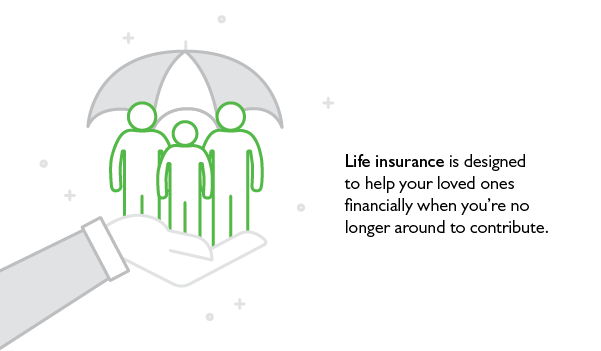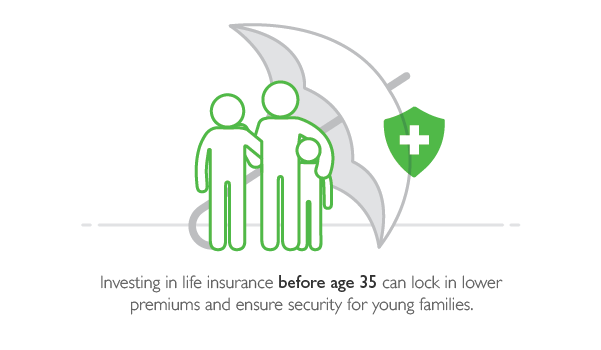Life insurance is not always the most comfortable subject to discuss. But just like home and auto insurance, life insurance is essential to you and your family’s financial security. Parents and working adults typically need a type of life insurance policy.
To help, let’s explore life insurance in more detail, how it works, what value it might provide to you, and how Bank Midwest can help you find the right policy.

What is life insurance?
Life insurance policies help your loved ones financially when you’re no longer around to contribute. It will help your family pay off debt, receive income, and reach major financial goals (like college tuition) in the event you’re not here. A life insurance policy is fundamental to planning out these financial considerations.
How does life insurance work?
In exchange for paying a monthly premium, you can get a set amount of insurance coverage. Upon your passing, your beneficiaries (usually your family) will receive a death benefit, which they can use to cover regular expenses or remaining debts.
Who needs to have life insurance?
Life insurance is right for almost everyone, even if you’re young. People in their 20s, 30s and even 40s often overlook life insurance. For one, it requires addressing an uncomfortable question. Many younger people also think a policy simply isn’t right for them given their age and family situations.
Opening a policy when you’re young and healthy could be a smart choice. You’re likely to get the best rates and terms because policies will be more expensive as you age. The more time it takes to open a policy, the more risk you face that an unexpected event could leave your family without coverage or financial help.

Which type of life insurance may be best for you?
Depending on where you’re at in your life, it’s important to know exactly which type of life insurance is best for you or if you need any at all. Different options include:
TERM LIFE INSURANCE
Term life insurance that has an expiration date. These terms often last 10, 15, 20, 25, or 30 years. This policy covers your family from when you take it out to the end of your set term. Younger individuals and families often opt for term life insurance. This is because they need more immediate protection and their future needs are less certain.
Many try to match their policy with financial obligations or goals. For example, a homeowner with 25 years remaining on their mortgage might take out a policy of the same length.
Or let’s say you’re 30 and plan to have kids soon. In that case, signing up for a 30-year policy would lock in your premiums for the next 30 years. At 59, you would be paying the same amount per month as you did at age 30.
The tradeoff is that the starting premium for a 30-year policy tends to be higher than say, a 10-year policy—precisely because you’re locked in. You also don’t know how much your life circumstances will change in 20 or 30 years – what types of new expenses you’ll incur, your income, inheritances, etc. In the long run, though, a 30-year term will usually be cheaper than three consecutive 10-year terms.
WHOLE LIFE INSURANCE
Like term life insurance, whole life policies provide a death benefit and other benefits that we’ll get into later. But they have a key difference: A whole life policy never expires. The main advantage of a whole life policy is that it builds cash value. A portion of each premium payment you make is put away in a different account that can be invested or accessed through a loan.
UNIVERSAL LIFE INSURANCE
A universal life policy is another form of permanent life insurance. The difference is that it gives the policy owner much more flexibility in terms of their premiums and cash value. Whereas a term or whole life policy locks in your rate, a universal policy allows you to pay what you’re able to or want to with each premium. It also allows you to adjust your death benefit during the policy, which can’t be done with other types of life insurance.
Signing up for a life insurance policy (whole or term) sooner rather than later can help you lock in lower premiums. If you have dependents, such as children, a spouse, or parents you’re caring for – and lack significant wealth – it may be in your best interest to purchase a policy even if you are relatively young.
Should anything happen to you, you have the peace of mind to know that you’ll leave your loved ones with the financial means to settle any remaining expenses, cover the costs of a funeral, and have some money left over for the future.
Are there more benefits in a life insurance policy outside of a death benefit?
Many life insurance policies offer riders and other perks along with a death benefit. Riders are optional adjustments that you can make to your policy to increase your coverage and fit your needs. Common riders include:
- Accidental death and dismemberment. This rider extends your coverage and can provide for your family in the event of an accident that leads to a disability or death (i.e., an accident involving public transportation).
- Long-term care. If a policy owner needs funds to cover long-term care expenses, this rider, when activated, will provide monthly payments to cover those costs.
- Premium waiver. This rider can waive premiums after that event so coverage is not lost if the policy owner cannot pay the monthly costs of their policy.
A life insurance policy can open doors to other benefits and savings, too. Many life insurance companies will give policyholders discounts on health and wellness products and services, like gym memberships. You can research different providers to find the best offer for you.
How do I have a conversation about life insurance?
Conversations about life insurance may be difficult to start. Here are our top tips for initiating the conversation.
- Start early, when there’s enough time to lock in a favorable rate and coverage option.
- Be open and honest with your family.
- Seek the help of a professional.
While life insurance benefits are straightforward, it can still take a lot of time and effort to find the ideal policy. Don’t wait to start thinking about life insurance. The sooner you consider your options, the more choices you’ll have available to you.
Bank Midwest can help make this process easier on you by connecting you with an insurance agent, who will guide you through your choices.
